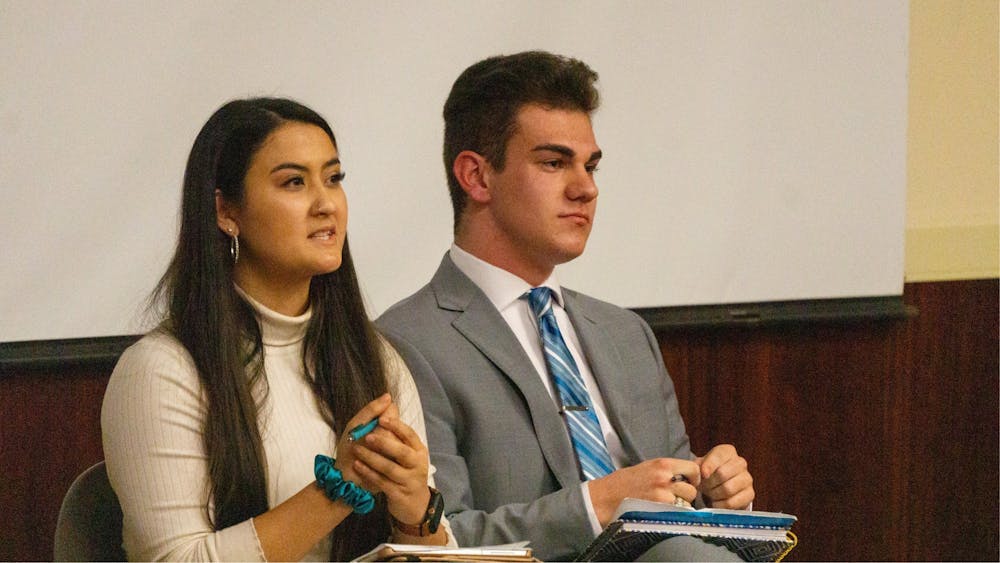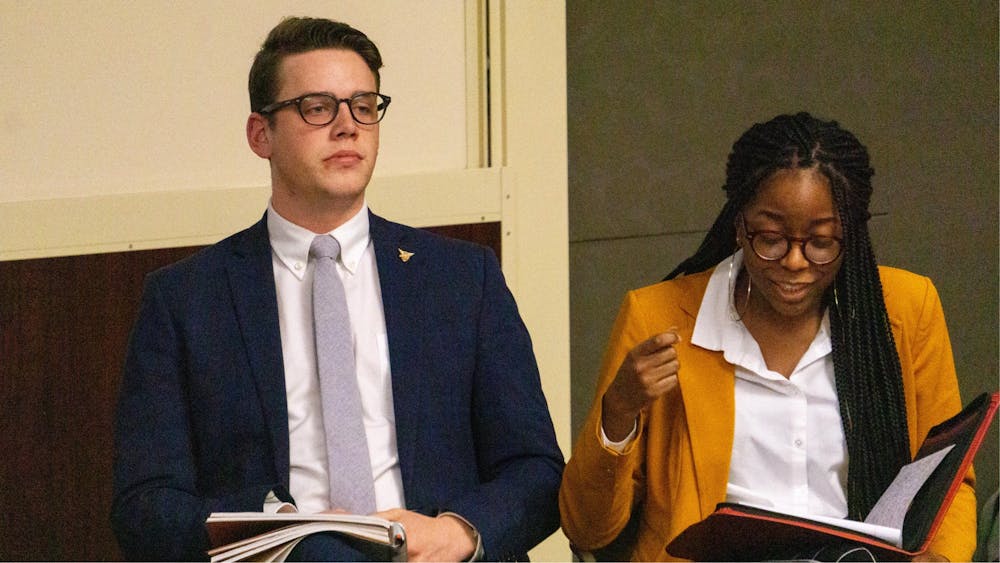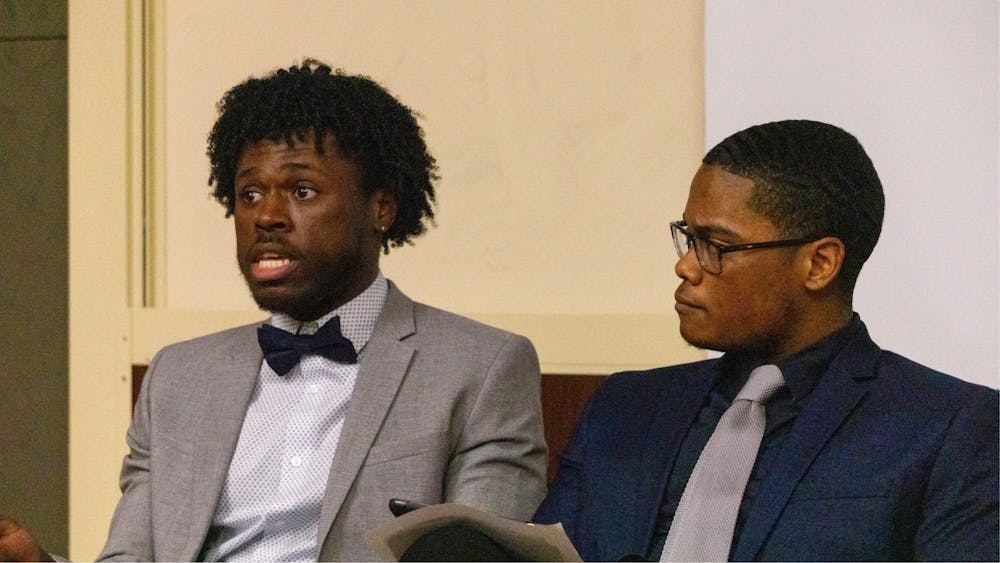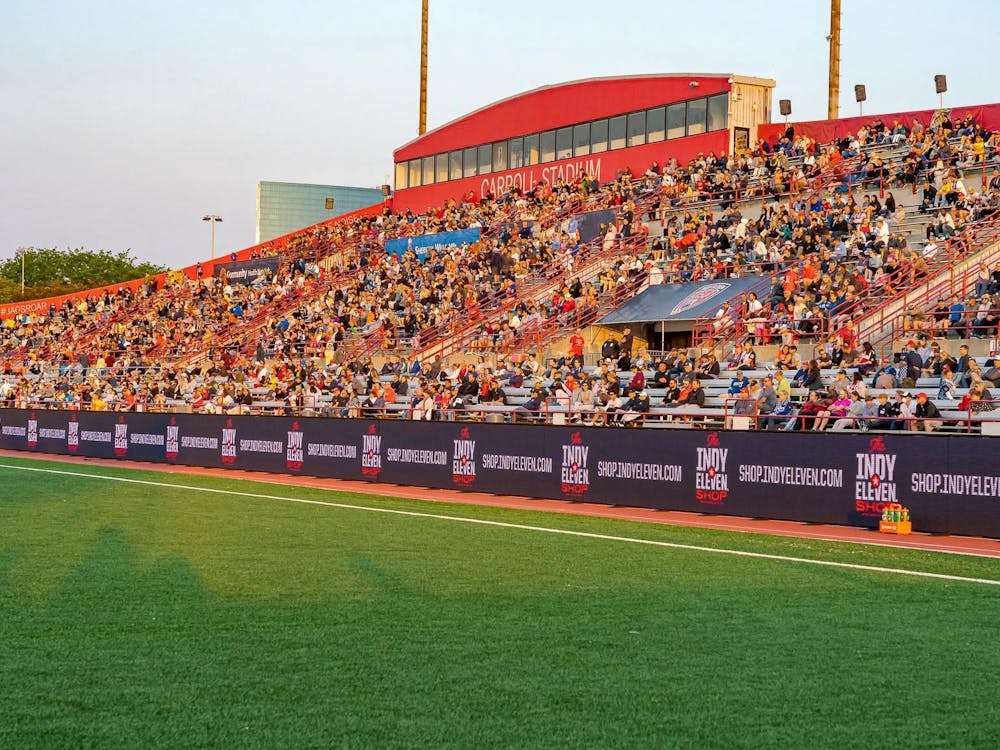The nominees for Student Government Association’s (SGA) presidential and vice presidential positions met again Monday night at the Arts and Journalism Building, this time without their treasurer and secretary nominees.
Questions presented to the slates were on issues such as a letter to the editor in support of marketing professor Shaheen Borna written by Ball State faculty.
RELATED: Letter to the Editor: Faculty 'express their continued support to Dr. Borna'
“I'm actually really grateful that the faculty wrote that letter because I think it's important that that viewpoint is shared because they exist, you know what I mean, and that's exactly what we're trying to combat when it comes to cultural insensitivity and cultural awareness,” Alliance slate presidential nominee Aric Fulton said. “I'm actually happy that they were comfortable in that decision because I personally will never be enrolled in any of those courses.”
Miryam Bevelle, Aureum slate presidential nominee, said though she understood the bias as fellow professionals the writers of the letter felt, she felt the faculty are beholden to the interests of the students.
“The only reason they have this job is because of us students,” Bevelle said. "How can they know proudly support their colleague instead of putting him back in check whenever something terrible has happened to a student?”

Aureum slate presidential and vice presidential candidates Miryam Bevelle and Dylan Lewandowski take part in the Student Government Association’s presidential debate Feb. 10 at the Arts and Journalism Building. Issues discussed during the debate included disability service improvements and an issue involving a letter to the editor on professor Shaheen Borna. John Lynch, DN
Bold slate vice presidential candidate Jordyn Blythe said the lack of understanding of the context by Borna and the faculty who wrote the letter were concerning. She also said the letter was another reason Ball State’s faculty should go through mandatory diversity and bias training.
“I think it’s important to consider that regardless of the intent, the implications are what’s important,” Blythe said. “Regardless of what was intended by making the phone call, the implication is that when you call the police on a black body, that black body’s now into greater significant danger than had [they] not.”
The candidates also addressed how they would approach supporting students with disabilities on campus.
Dylan Lewandowski, Aureum slate vice presidential candidate, said expanding the yellow bus loop could improve the transportation issue.
“There is a bus loop that people don't really know a whole lot about,” Lewandowski said. “It's referred to as the yellow loop, and that is the disability bus. We really want to expand the widespread use of how this can appeal to more students, not just chair users, students of all disabilities and also students who are experiencing injuries if they're on crutches.”
Bevelle also said improvements could be made across campus, like fixing broken disability door buttons and adding disability support to more bathrooms.
Blythe took a similar position, saying the accessibility buttons on some doors “suck,” and making sure disability services and equipment functioned properly.
Additionally, Sanburn said making improvements to Ball State’s Map App would make navigating campus easier for students with visual and hearing disabilities.
“We want to make sure that every student can get around campus in a good fashion, make sure that they’re not bumping into anything and make sure that our campus is even more accessible walking around and as students can hear their way around,” he said.

Connor Sanburn and Jordyn Blythe, the presidential and vice presidential candidates for the Bold slate, express their opinions during the debate Feb 10. at the Arts and Journalism Building. A final slate debate will be held on Feb. 13. John Lynch, DN
Jones said the Alliance slate also favored expanding the yellow loop, saying as it did not run during the summer, it could not support students that take summer classes.
Finally, the presidential candidates were asked whether they would sign and support legislation in the University Senate they disagreed with personally.
Fulton said he would support legislation he did not agree with, saying if it was in the will of the student body, he would pass it.
“I think that the role of the president goes beyond, you know, personal interest and personal goals,” Fulton said. “I think that definitely goes into why we [Alliance] don't have platform points because we're more interested in hearing what students want to see.”
Sanburn said SGA presidents had to support legislation introduced by the senators, whether or not they represented the interests of the student body.
“Whether I disagree with it or not, I took on this role to be a president for all students, not just for the students that I care about or I represent,” he said.
The Aureum slate took a slightly different direction, with Bevelle saying she would abstain from signing or vetoing legislation she personally disagreed with, in which case the legislation would still pass to the University Senate.
“I would still be able to champion it in the University Senate, and if people asked me why I didn't sign it, that's all I can say, [that] I had a personal conflict of interest,” Bevelle said.
The election will take place 7 p.m. Feb. 13 in Teachers College room 120.
Contact John Lynch with comments at jplynch@bsu.edu or on Twitter @WritesLynch.





